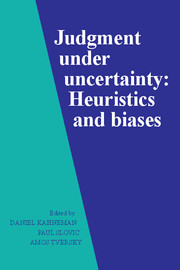Book contents
- Frontmatter
- Contents
- List of contributors
- Preface
- Part I Introduction
- Part II Representativeness
- Part III Causality and attribution
- Part IV Availability
- Part V Covariation and control
- Part VI Overconfidence
- Part VII Multistage evaluation
- Part VIII Corrective procedures
- 28 The robust beauty of improper linear models in decision making
- 29 The vitality of mythical numbers
- 30 Intuitive prediction: Biases and corrective procedures
- 31 Debiasing
- 32 Improving inductive inference
- Part IX Risk perception
- Part X Postscript
- References
- Index
30 - Intuitive prediction: Biases and corrective procedures
Published online by Cambridge University Press: 05 May 2013
- Frontmatter
- Contents
- List of contributors
- Preface
- Part I Introduction
- Part II Representativeness
- Part III Causality and attribution
- Part IV Availability
- Part V Covariation and control
- Part VI Overconfidence
- Part VII Multistage evaluation
- Part VIII Corrective procedures
- 28 The robust beauty of improper linear models in decision making
- 29 The vitality of mythical numbers
- 30 Intuitive prediction: Biases and corrective procedures
- 31 Debiasing
- 32 Improving inductive inference
- Part IX Risk perception
- Part X Postscript
- References
- Index
Summary
Introduction
Any significant activity of forecasting involves a large component of judgment, intuition, and educated guesswork. Indeed, the opinions of experts are the source of many technological, political, and social forecasts. Opinions and intuitions play an important part even where the forecasts are obtained by a mathematical model or a simulation. Intuitive judgments enter in the choice of the variables that are considered in such models, the impact factors that are assigned to them, and the initial values that are assumed to hold. The critical role of intuition in all varieties of forecasting calls for an analysis of the factors that limit the accuracy of expert judgments, and for the development of procedures designed to improve the quality of these judgments. …
Singular and distributional data
Experts are often required to provide a best guess, estimate, or prediction concerning an uncertain quantity such as the value of the Dow-Jones index on a particular day, the future sales of a product, or the outcome of an election. A distinction should be made between two types of information that are available to the forecaster: singular and distributional. Singular information, or case data, consists of evidence about the particular case under consideration. Distributional information, or base-rate data, consists of knowledge about the distribution of outcomes in similar situations.
- Type
- Chapter
- Information
- Judgment under UncertaintyHeuristics and Biases, pp. 414 - 421Publisher: Cambridge University PressPrint publication year: 1982
- 151
- Cited by



